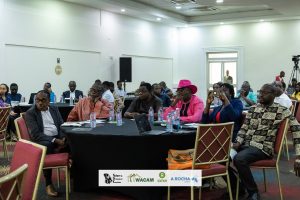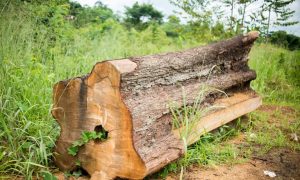We prefer selling trees to illegal chainsaw operators - Cocoa farmers
Cocoa farmers in the Sefwi Wiawso, Goaso and Dormaa enclaves say they prefer giving away the trees on their farms to illegal chainsaw operators because they ensure speedy removal of trees and cause less destruction, thus facilitating their farming activities.
“Illegal Chainsaw operators do not delay our farming practices, pay us good monies for the trees on our farms and do not cause much destruction to our crops” the Cocoa farmers claim.
Explaining their point to officials of the Nature and Development Foundation (NDF), the farmers said, within days after they reach an agreement with the operator, the trees are removed, and one has space and time to carry out his/her farming activities. Additionally, the operators do not haul the trees but rather, process them into beams at the very place it is felled.
This, they clarified, prevents the destruction that hauling does to farms and crops; plus, the rate they offer for the trees are relatively higher than what the legal timber operators offer. Hence they think it is more profitable for them to give out their trees to the illegal chainsaw operators.
According to the farmers, the legal timber operators who usually come to salvage the trees on their farms before the planting of their food crop commences, delay their farming operations. They claim it can take months before the legal operators finally come to remove the trees after getting their consent to remove them. By that time, the farmers may have long finished consuming the monies paid to them for the trees.
They explained that sometimes, they even prepare the land and commence planting before the legal operators come to remove the trees, adding that hauling of the trees felled causes much destruction to their farm and crops. As a result, they rather prefer to give the trees out to the illegal chainsaw operators than to the legal operators.
Further enquiries from some sawmill operators within the enclave, attested to the claims of the farmers with the Forestry Commission standing accused of unnecessary delays and cumbersome processes.
According to them, it takes as long as 3 to 6 months to obtain one salvage permit and by which time the farmer may have planted his crops or even given out the trees to illegal operators. The legal operators narrated that, the act is crippling their businesses, and are therefore calling upon the Forestry Commission to remedy the situation.
This situation was unearthed when Nature and Development Foundation (NDF) visited the area to engage with saw millers on FLEGT Legality Compliance. As part of the engagement, saw millers were taken through the legality verification principles of the Timber Validation Department and enlightened on various documentation they must keep and file to show as proof of compliance.
Operators of sawmills were mock audited and action plans to correct identified gaps were developed for each of the companies. Prevalent among the gaps identified were the non-payment of SSINT for permanent workers. Issues of safety and health were also noted to be of great cause of concern as most of the facilities paid little or no attention to safety matters of the job. NDF, therefore, offered onsite education on safety and health for management and staff.
Ending the training, management and workers of each company visited were grateful for the support and asked that such engagements should be repeated at least once quarterly. This action by NDF is part of implementing the project, “Building the capacity of the small and medium forest enterprises in Ghana and Liberia to supply and trade in legal timber”. The project is funded by UK aid under the Forest Governance Market and Climate (FGMC) Programme.
AUTHOR
Nature & Development Foundation


